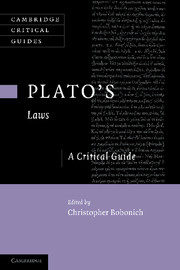Book contents
- Frontmatter
- Contents
- List of contributors
- Introduction
- 1 The Laws' two projects
- 2 The relationship of the Laws to other dialogues: A proposal
- 3 Ordinary virtue from the Phaedo to the Laws
- 4 Virtue and law in Plato
- 5 Morality as law and morality in the Laws
- 6 Puppets on strings: Moral psychology in Laws Books 1 and 2
- 7 Psychology and the inculcation of virtue in Plato's Laws
- 8 Images of irrationality
- 9 Family and the question of women in the Laws
- 10 The theology of the Laws
- 11 Plato's ‘truest tragedy’: Laws Book 7, 817a–d
- Bibliography
- Index
4 - Virtue and law in Plato
Published online by Cambridge University Press: 06 December 2010
- Frontmatter
- Contents
- List of contributors
- Introduction
- 1 The Laws' two projects
- 2 The relationship of the Laws to other dialogues: A proposal
- 3 Ordinary virtue from the Phaedo to the Laws
- 4 Virtue and law in Plato
- 5 Morality as law and morality in the Laws
- 6 Puppets on strings: Moral psychology in Laws Books 1 and 2
- 7 Psychology and the inculcation of virtue in Plato's Laws
- 8 Images of irrationality
- 9 Family and the question of women in the Laws
- 10 The theology of the Laws
- 11 Plato's ‘truest tragedy’: Laws Book 7, 817a–d
- Bibliography
- Index
Summary
In both the Republic and the Laws, Plato delineates societies whose aim is the happiness of the citizens; and in both works they are to achieve happiness by living a life of virtue. It is the chief aim of Magnesia, the city of the Laws – one it shares with the Doric societies of Sparta and Crete, though with an enlarged and improved view of it – to make the citizens happy by rendering them virtuous.
In the Laws we do not find an account of virtue as the harmony of the soul's parts, as we do in the Republic, but this does not indicate that Plato has narrowed or impoverished his view of virtue as the good condition of the person's character. Virtue is not merely a matter of reliably doing the right thing, but requires that the person do it in the right way, with the right understanding and with the right feelings. So much is clear from the important programme of education, which is to train the citizens of Magnesia not just to do the right things but to enjoy this, to find a life of virtue pleasant and a life of vice repulsive.
There is one obvious change: in Magnesia the citizens are to become virtuous by growing up and living in a society explicitly regulated by laws.
- Type
- Chapter
- Information
- Plato's 'Laws'A Critical Guide, pp. 71 - 91Publisher: Cambridge University PressPrint publication year: 2010
- 7
- Cited by

